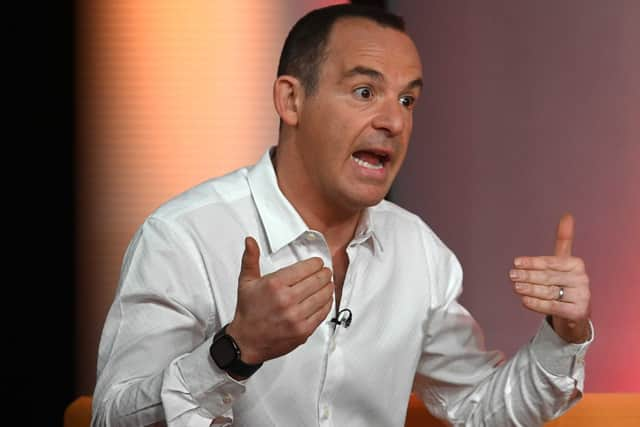Martin Lewis's anger at Ofgem crossed a line, but it's a sign of growing concern about the energy regulator – Martyn McLaughlin
Mr Lewis, the founder of the popular Money Saving Expert website, was among those being briefed by Ofgem about proposed changes to the energy price cap and what is known as the market stabilisation charge, when he could hold his tongue no longer.
The plans, he declared, amounted to a “******* disgrace that sells consumers down the river”. Later, having apologised for his intemperate language, Mr Lewis expressed his ire more calmly. He warned that the shake-up was tantamount to an anti-competitive measure and would prevent firms from introducing cheaper, fixed-term deals.
Advertisement
Hide AdAdvertisement
Hide AdOfgem, unsurprisingly, takes a different view. It says the changes will mean the price cap is more in tune with market prices, with any price falls passed on more quickly to consumers (the same also applies, it failed to mention, when prices rise).


The regulator also argues that the shift allows energy suppliers to better predict their own energy purchases, reducing the risk of their collapse, with the stabilisation charge helping to keep the retail market on an even keel.
It is not a necessarily unwelcome move, but as Mr Lewis perhaps hinted at, it feels somewhat like Ofgem is slamming shut the stable door after the horse has bolted, and conveniently glossing over its own failings which have contributed to the crisis.
Its announcement put considerable emphasis on the “unprecedented market conditions” which have led to a surge in wholesale costs. There can be no doubt that is the major contributory factor behind the spike in household bills, but it is not the only one.
The failure of Ofgem to oversee a robust regulatory environment has been damning. It has contributed directly to the collapse of more than 30 under-capitalised energy suppliers. That in turn has led to higher bills for consumers in order to cover the cost to those companies taking on extra customers.
It is estimated that around £200 million was swallowed up as the firms fell in rapid succession. That money is now being paid back by households by surcharges on their bills. Indeed, when the price cap jumped by £693 back in April, some £68 of that increase was made up of the recovery of so-called ‘supplier of last resort’ levy costs – in other words, the costs for moving customers from failed firms like Green, People’s Energy, Utility Point, and Avro.
The latter firm is a particularly ignominious example of how Ofgem’s reluctance to intervene in the retail energy market has exacerbated the energy crisis.
Between 2018 and 2021, the company’s customer base expanded rapidly, nearly trebling from 210,000 to just under 600,000. But that breakneck growth was achieved on distinctly shoogly foundations.
Advertisement
Hide AdAdvertisement
Hide AdAdministrators of the failed supplier, which went bust owing around a quarter of a billion pounds to its creditors, found that it had no external funding or security over its assets, and was financed through working capital generated from its trading operations. It also failed to buy sufficient energy in advance from wholesale markets, a practice known as hedging.
Such dubious governance was not isolated to Avro. Bulb, the biggest supplier to fail in the midst of the wholesale price rises, was also exposed thanks to poor capitalisation and inadequate hedging, with the Treasury left to pick up the pieces.
These were no accidents. For years, Ofgem simply sat back and allowed a proliferation of start-up suppliers to swamp the market and take a punt on wholesale prices. For close to a decade, it was warned repeatedly and frequently that it was creating an unsustainable framework.
In fact, Citizens Advice said Ofgem was presented with details of potential breaches of the suppliers’ licence conditions, yet failed to take any meaningful enforcement action. The regulatory landscape, it added, amounted to one in which Ofgem “readily allowed rule-breaking with little consequence to companies, at the expense of customers”.
Even a casual observer could see the red flags – very few of the new suppliers turned a profit – and despite Ofgem’s attempts at putting in place licensing reforms, it was too little, too late, and could not prevent many smaller suppliers from collapsing like a house of cards.
Were it ever in any doubt, the regulator’s lamentable role in all of this was laid bare last week in an external review it commissioned from Oxera, an economics and finance consultancy.
It ruled that Ofgem was so intent on incentivising competition among suppliers that it effectively gave new firms a “free bet”, allowing them to join the fray with minimal risk and little in the way of capital commitments.
“This regulatory approach does not seem to have been justified by an evidence-based assessment of trade-offs or a detailed understanding of the supplier business models and supplier incentives,” Oxera noted.
Advertisement
Hide AdAdvertisement
Hide AdOfgem has since published an action plan designed to strengthen the financial resilience of suppliers in the short to medium term, but as with its other interventions in recent years, it will do little to help those households suffering from the deepening cost-of-living crisis.
It feels like a regulator established to safeguard consumers and bring about a fairer energy system is more concerned about protecting big energy businesses. For hard-up families who see no end in sight to the current price crisis, that is an insult.
Ensuring there is no repeat of the current sorry situation will not be easy. It will require a transformative diversification of energy supplies to minimise volatility. But it looks increasingly clear that hard questions have to be asked about whether the so-called regulator is fit for purpose.
Comments
Want to join the conversation? Please or to comment on this article.
